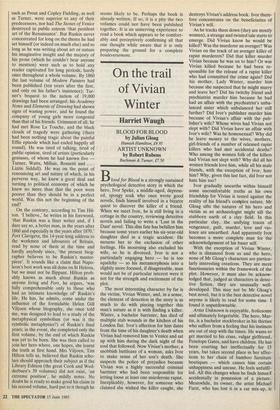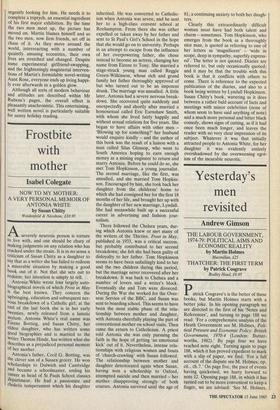On the trail of Vivian Winter
Harriet Waugh
BLOOD FOR BLOOD by Julian Gloag
Hamish Hamilton, £9.95
ARTIST UNKNOWN by Robert Rubens
Bachman & Turner, £7.50
Blood for Blood is a strongly sustained psychological detective story in which the hero, Ivor Speke, a middle-aged, depress- ed, spongy soak who once wrote good novels, finds himself involved in a bizarre quest to discover the killer of a friend. When we meet Ivor, he is still living in a cottage in the country, reviewing detective novels and failing to write a 'Lust in the Dust' novel. This dim fate has befallen him because some years earlier his six-year-old daughter died in a tragic accident. He mourns her to the exclusion of other feelings. His mourning also excluded his wife, so he is divorced. Ivor is not a particularly engaging hero — he is too squelchy — so his metamorphosis into a slightly more focused, if disagreeable, man would not be of particular interest were it not for the strength and excitement of the plot.
The most interesting character by far is the victim, Vivian Winter, and, in a sense, the element of detection in the story is as much to do with piecing together this man's nature as it is with finding a killer. Winter, a bachelor barrister, has died of multiple stab wounds in the kitchen of his London flat. Ivor's affection for him dates from the time of his daughter's death when Vivian had removed him to Venice and sat up with him during the dark night of the soul that followed. Now Vivian's mother, a snobbish battleaxe of a woman, asks Ivor to make sense of her son's death. She suspects the police of prejudice because Vivian was a highly successful criminal barrister who had been responsible for letting loose at least one murderous rapist. Inexplicably, however, for someone who claimed she wished the killer caught, she destroys Vivian's address book. Ivor there- fore concentrates on the beneficiaries of Vivian's will.
As he tracks them down (they are mostly women), a strange and twisted tale starts to emerge. Did Vivian know he would be killed? Was the murderer an avenger? Was Vivian on the track of an avenger killer of rapist murderers? Did that killer murder Vivian because he was on to him? Or was Vivian killed because he had been re- sponsible for the release of a rapist killer who had committed the crime again? Did his mother, Lady Winter, murder him because she suspected that he might marry and leave her? Did his twitchy friend and psychiatrist murder him because he had had an affair with the psychiatrist's unba- lanced sister which unbalanced her still further? Did Ivor's publisher murder him because of Vivian's affair with the pub- lisher's wife? Whose wives had Vivian not slept with? Did Vivian have an affair with Ivor's wife? Was he homosexual? Why did he leave money to the wives, mothers, girl-friends of a number of released rapist killers who had met accidental deaths?
Who among the women folk of the killers had Vivian not slept with? Why did all his women friends love him, while all his male friends, with the exception of Ivor, hate him? Why, given this last fact, did Ivor not hate him too?
Ivor gradually unearths within himself some uncomfortable truths as his own friendship for Vivian is tested against the reality of his friend's complex nature. Mr Gloag sifts the natures of his hero and victim as an archaeologist might sift the stubborn earth of a clay field. In this particular clay, the unifying traces of vengeance, guilt, murder, love and vio- lence are unearthed. And apparently Ivor becomes a more complete man for the acknowledgement of his baser self.
With the exception of Vivian Winter, who is distanced from us and the hero, none of Mr Gloag's characters are particu- larly interesting creations. They are mere functionaries within the framework of the plot. However, it must also be acknow- ledged that, judged as 'characters in detec- tive fiction, they are unusually well- developed. This may not be Mr Gloag's best novel, but it is the best detective novel anyone is likely to read for some time. I found it unputdownable.
Artist Unknown is enjoyable, frolicsome and ultimately forgettable. The hero, Mar-
tin, is a bachelor stockbroker in his thirties who suffers from a feeling that his instincts are out of step with the times. He wants to get married to his crass, vulgar girlfriend, Penelope Gates, and have children. He has been courting her ineffectually for 15 years, but takes second place in her affec- tions to her chain of bamboo furniture boutiques — which causes him certain unhappiness and unease. He feels unfulfil- led. All this changes when he finds himself accidentally in possession of a picture.
Meanwhile, its owner, the artist Michael Furst, who has lost it in a car mix-up, is urgently looking for him. He needs it to complete a triptych, an essential ingredient of his first major exhibition. By the time the two men meet up, the picture has moved on. Martin blames himself and so the two men, now firm friends, set off in chase of it. As they move around the world, interreacting with a number of quaintly amusing eccentrics, their own lives are stretched and changed. Despite some experimental girlfriend-swapping, and the frighteningly magisterial interven- tions of Martin's formidable novel-writing Aunt Rose, everyone ends up living happi- ly ever afterwards in a golden glow.
Although all sorts of modern behaviour and attitudes are described within Mr Rubens's pages, the overall effect is pleasantly anachronistic. This entertaining, well written novel is particularly suitable for sunny holiday reading.



















































 Previous page
Previous page